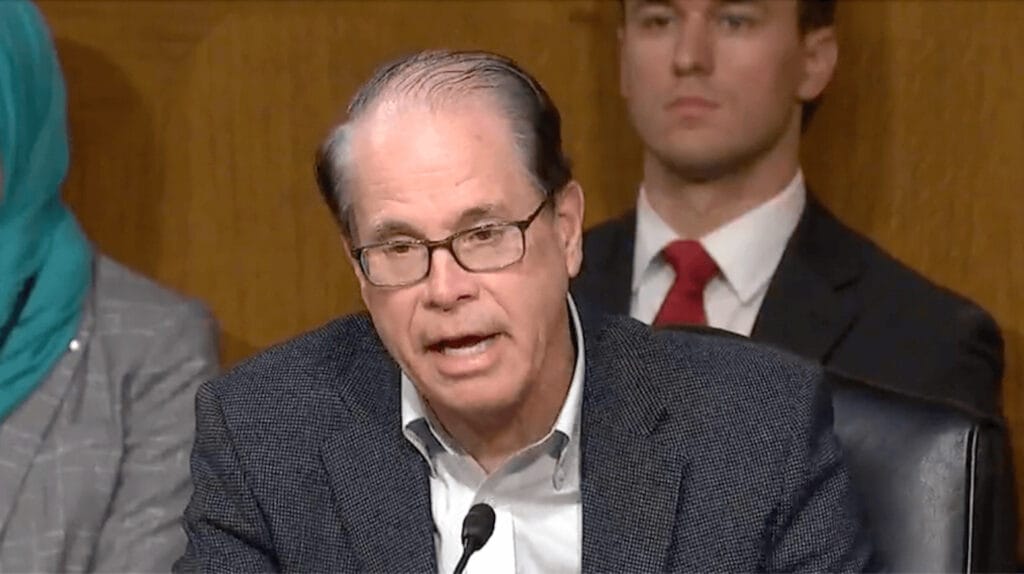

The National Labor Relations Board’s new “joint employer” rule will have a “particularly negative impact on senior living arrangements,” the top Republican member of the Senate Special Committee on Aging and three other Republicans on the committee told NLRB Chairman Lauren McFerran.
Sen. Mike Braun of Indiana, the ranking member, along with Sens. Pete Ricketts of Nebraska, Marco Rubio of Florida and Tim Scott of South Carolina, wrote in a Nov. 17 letter to McFerran that they have “significant concerns” about the rule’s potential effects on older Americans.
“Long-term care organizations frequently depend on stable contracts with a broad set of partners for effective operations. These contracts cover vital residential supports, from nutrition services and maintenance to staffing arrangements,” the senators wrote, citing an Oct. 27 McKnight’s Senior Living article that detailed senior living industry opposition to the rule.
Under the new rule, which goes into effect Feb, 26, “an entity may be considered a joint employer of a group of employees if each entity has an employment relationship with the employees and they share or co-determine one or more of the employees’ essential terms and conditions of employment,” the NLRB said in October when the final rule was issued. Those terms and conditions, according to the board, include:
- wages, benefits and other compensation;
- hours of work and scheduling;
- the assignment of duties to be performed;
- the supervision of the performance of duties;
- work rules and directions governing the manner, means, and methods of the performance of duties and the grounds for discipline;
- the tenure of employment, including hiring and discharge; and
- working conditions related to the safety and health of employees.
The rule will rescind and replace one, promulgated in 2020 under the previous board, that some viewed as being more favorable to employers.
“In particular, the 2023 rule considers the alleged joint employers’ authority to control essential terms and conditions of employment, whether or not such control is exercised, and without regard to whether any such exercise of control is direct or indirect,” the NLRB said in a fact sheet. “By contrast, the 2020 rule made it easier for actual joint employers to avoid a finding of joint-employer status because it set a higher threshold of ‘substantial direct and immediate control’ over essential terms of conditions of employment, which has no foundation in common law.”
Senior living and other long-term care providers that use temporary or contract workers, as well as operators that are part of franchises, are among those that will be affected.
The new rule, according to the four Republican senators, will “disrupt long-term care organizations’ stable relationships and longstanding practices that have provided many older adults with high levels of support and satisfaction.” Senior living operators, they said, will face increased liability for contracts with other service providers as well as “onerous” collective bargaining standards.
“We urge the Board to reconsider the impact of its rule, reengage with aging services stakeholders, and return to the 2020 rule’s fairness and flexibility,” they wrote.
Twenty-two Democratic senators, including Senate Aging Committee Chair Bob Casey of Pennsylvania and three other current members of the committee (Sens. Richard Blumenthal of Connecticut, Kirsten Gillibrand of New York and Elizabeth Warren of Massachusetts), previously expressed support for the rule after it was proposed in September 2022 and as the NLRB considered comments before finalizing it in October 2023.
The rule, they said in a Dec. 7, 2022, letter to the NLRB, is “both good policy and furthers congressional intent motivating the passage of the National Labor Relations Act (NLRA) itself.”
Meanwhile, a lawsuit filed against the NLRB earlier this month over the rule gained additional support last week when the American Hospital Association filed a friend-of-the-court brief.
“[T]he Final Rule could result in virtually every outside contract worker being classified as part of a ‘joint employment’ relationship with the hospital,” the association said in the amicus brief, which was submitted Nov. 20 in support of a lawsuit filed Nov. 9 by the US Chamber of Commerce and a coalition of business groups. The lawsuit calls the new rule “overbroad” and said that it “harms the workers, labor unions, and employers the Board purports to protect” in healthcare and other sectors.
The same day that the amicus brief was filed, the NLRB asked that the case be transferred from the US District Court for the Eastern District of Texas to the US Court of Appeals for the District of Columbia Circuit, saying that the Texas court lacked subject-matter jurisdiction “because review of the National Labor Relations Board (“NLRB”) rule at issue here must occur in a United States court of appeals.” The board’s request was granted.
Sixty-two business associations, including the American Seniors Housing Association, sent a letter to Congress earlier this month urging legislators to support a Congressional Review Act resolution to nullify the rule. The bipartisan resolution was introduced by Sens. Bill Cassidy (R-LA) and Joe Manchin (D-WV).
The effective date of the new joint employer rule originally was Dec. 26, but the NLRB announced a two-month extension of the date on Nov. 16, saying that the delay was “to facilitate resolution of legal challenges with respect to the rule.”
Cassidy, the ranking member of the Senate Health, Education, Labor and Pensions (HELP) Committee, also had told the NLRB on Nov. 15 that its issuance of the rule had not complied with the Congressional Review Act’s 60-day threshold rule. The Government Accountability Office had determined that the final rule did not have a required 60-day delay in its initial effective date, he said.

